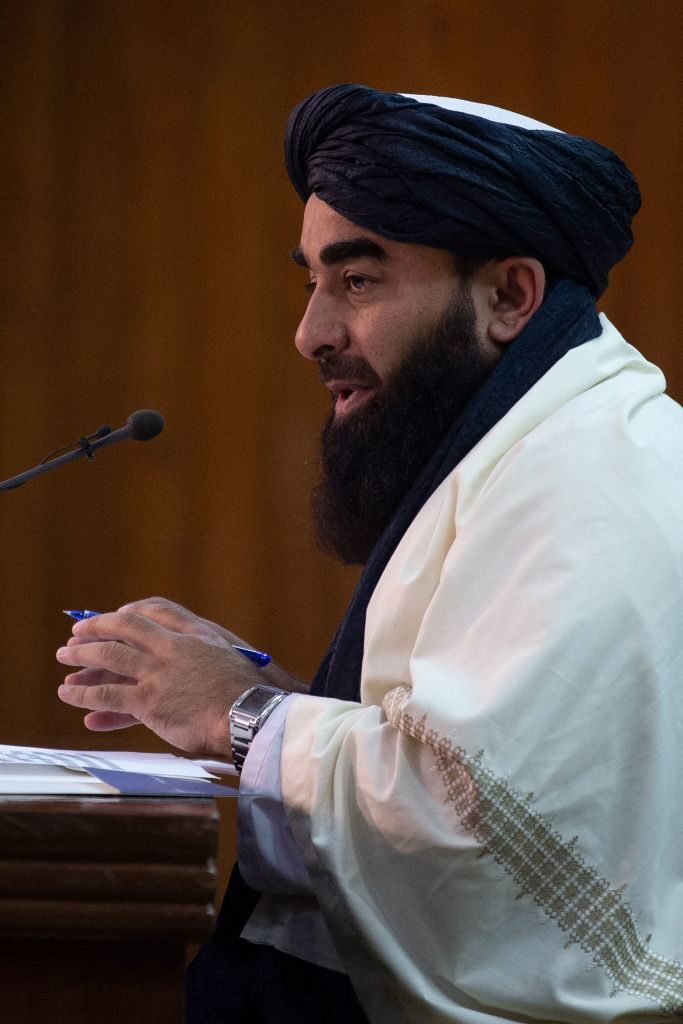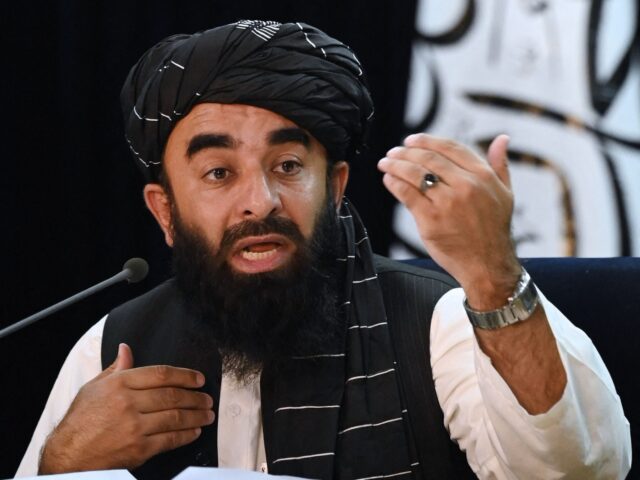Taliban spokesman Zabihullah Mujahid issued a statement late Monday “strongly condemning” an American drone strike in Kabul, Afghanistan, that leftist President Joe Biden announced had killed the leader of al-Qaeda, Ayman al-Zawahiri.
Reports citing American intelligence officials indicate that al-Zawahiri, who took over the organization after the American government eliminated predecessor Osama bin Laden, was living openly and comfortably in Kabul after the U.S.-backed government abandoned the country to the Taliban.
Biden announced in an evening address on Monday that an American airstrike had killed al-Zawahiri while leaving no civilian casualties – a stark contrast to the Biden airstrike that killed ten Afghan civilians last year, including children, with no national security benefits.
Taliban officials had agreed in a deal with the government of former President Donald Trump to cut all ties to al-Qaeda and other jihadist terrorist groups in exchange for Washington to withdraw all troops and end the two-decade-old Afghan war. Biden broke that agreement last year, failing to honor the May 1, 2021, deadline both sides had agreed to and extending the war into August.
The Taliban called Biden’s extension of the Afghan War a violation of the agreement brokered with Trump in Doha, Qatar, and used that to launch a campaign of conquest that culminated in the capture of Kabul on August 15, 2022 – which, naturally, also violated the agreement. Mujahid (pictured, top), the spokesman, later falsely claimed the Taliban had never agreed to cut ties with al-Qaeda.
“Nowhere in the agreement has it been mentioned that we have or don’t have ties with anyone,” he alleged.
Despite Biden violating the agreement last year, Mujahid complained on Monday that the strike that eliminated al-Zawahiri was a violation of the Doha deal.
Mujahid’s statement first confirmed that an American airstrike had occurred in Kabul.
“The Islamic Emirate’s [the Taliban’s] security and intelligence agencies investigated the incident and in their preliminary investigations found that the attack was carried out by American drones,” the statement read.
“The Islamic Emirate of Afghanistan strongly condemns this attack for any reason and calls it a clear violation of international principles and the Doha Agreement,” Mujahid wrote. “Such actions are a repetition of the failed experiences of the past 20 years and are against the interests of the United States of America, Afghanistan, and the region. Repeating such actions will damage available opportunities.”
Mujahid notably failed to mention al-Qaeda or Ayman al-Zawahiri in his condemnation.
Similarly, Biden did not mention the Taliban at all in his speech on Monday night announcing al-Zawahiri’s death.
Biden claimed the al-Qaeda leader had “moved to downtown Kabul to reunite with members of his immediate family,” without elaborating. The president instead focused on al-Zawahiri’s biographical information and warned, “no matter how long it takes — no matter where you hide — if you are a threat to our people, the United States will find you and take you out.”

Taliban spokesman Zabihullah Mujahid addresses a press conference on February 27, 2022. (WAKIL KOHSAR/AFP via Getty Images)
Biden emphasized “none of his [al-Zawahiri’s] family members were hurt and there were no civilian casualties.”
The president also claimed that the elimination of the top al-Qaeda target, which American officials were offering a $25 million reward for, showed the wisdom of Biden’s chaotic plan to extend the Afghan war, break the Trump-brokered deal with the Taliban, and abruptly leave the country in Taliban hands.
“When I ended our military mission in Afghanistan almost a year ago, I made the decision that after 20 years of war, the United States no longer needed thousands of boots on the ground in Afghanistan to protect America from terrorists who seek to do us harm,” Biden said. “We will never again allow Afghanistan to become a terrorist save-haven.”
The circumstances surrounding al-Zawahiri’s life in Kabul suggest that the Taliban was both aware of his presence and protecting him. The United Arab Emirates (UAE) newspaper the National reported on Tuesday that al-Zawahiri lived in an upscale Kabul neighborhood and “would regularly appear out in the open, on his balcony,” apparently with little concern about being identified.
“The Taliban have been accused of sheltering extremists for years. They’ve denied it again and again,” NPR reporter Steve Inskeep explained in a report on Monday from the Afghan capital, “But this was in a very heavily secured area of the city with checkpoints all over and very near the government ministries.”
A United Nations report published two weeks ago confirmed that al-Zawahiri was alive and “likely operating in Afghanistan.”
“Member States note that al-Zawahiri’s apparent increased comfort and ability to communicate has coincided with the Taliban’s takeover of Afghanistan and the consolidation of power of key [Al Qaeda] allies within their de facto administration,” the U.N. Analytical Support and Sanctions Monitoring Team observed.

File/As seen on a computer screen from a DVD prepared by Al-Sahab production, al-Qaida’s Ayman al-Zawahri speaks in Islamabad, Pakistan, on June 20, 2006. (AP Photo/B.K.Bangash, File)
White House National Security Council Spokesperson John Kirby conceded in an interview with MSNBC on Monday that “senior leaders of the Haqqani Network,” a terrorist entity with “government” positions in the Taliban that serves as the group’s liaison to al-Qaeda proper, “were aware” of al-Zawahiri’s whereabouts.
The Biden State Department bizarrely attempted to claim shortly after the Taliban’s conquest of Afghanistan last year that the Haqqani Network and the Taliban were “separate entities,” even as several members of the Haqqani family assumed senior positions in Taliban leadership.
Sirajuddin Haqqani, the head of the Haqqani Network, published an opinion article in the New York Times last year titled, “What We, the Taliban, Want.”

COMMENTS
Please let us know if you're having issues with commenting.